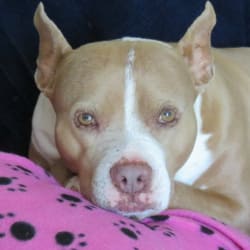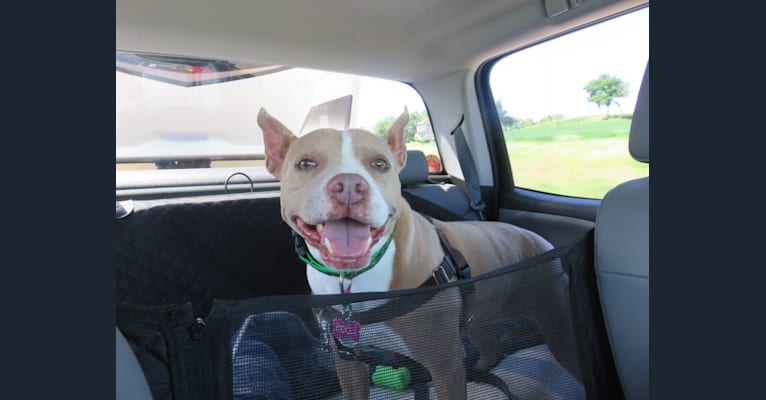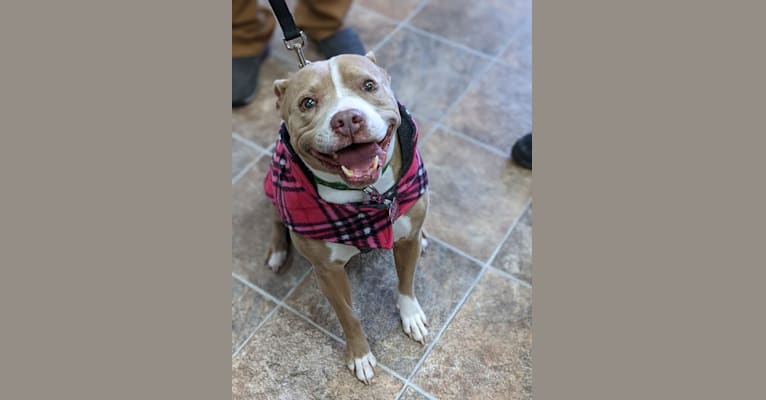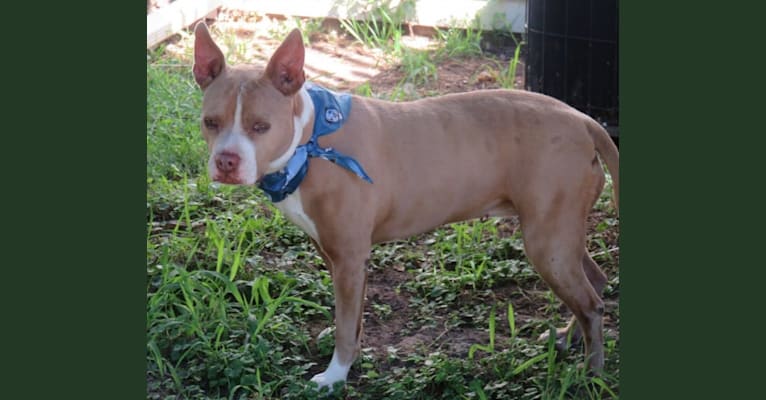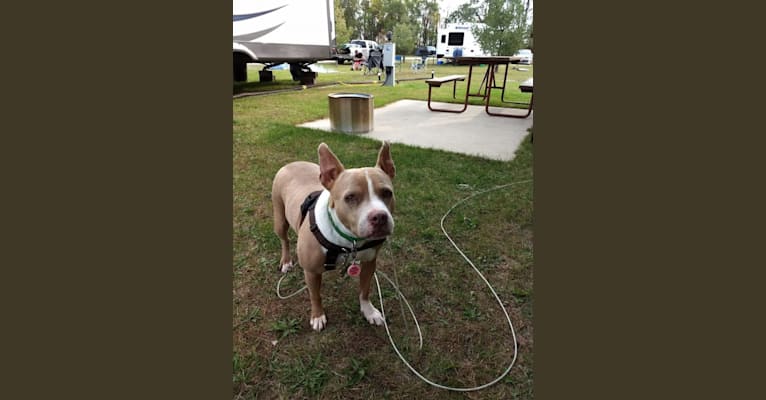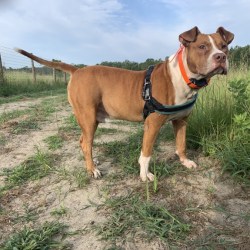Coqui inherited one copy of the variant we tested
No Dogs Available
It looks like you don’t have any dogs on your account yet. Activate a kit now!
Genetic Age
Please note that genetic age is different from calendar age. We can now estimate your dog's calendar age with the Embark Age Test.
The genetic age in this report is an estimation of where your dog is in his or her healthspan. Dogs age at very different rates due to a number of genetic and environmental factors. Body size is a strong genetic influence: for example, a seven year old Great Dane is at the start of his golden years, but a seven year old Pomeranian is just learning what "slow down" means. Just within this example, you can see that the old "one doggie year = seven human years" adage isn’t going to work. And yet, knowing your dog’s age is important: it informs what your dog needs as far as food, frequency of veterinary checkups, and exercise. So how do you best determine how old your dog is?
Embark's genetic age feature calculates how old your dog would be if he or she were aging at an average human rate (using humans in the USA as the baseline). So going back to our Dane/Pom example, we'd estimate a seven year old Great Dane at about 80 years old (senior citizen), but a seven year old Pom would be about 42 (adult). Makes way more sense, right?
| Calendar age | Genetic age |
|---|---|
| 1 year | 18 human years |
| 2 years | 25 human years |
| 3 years | 30 human years |
| 4 years | 36 human years |
| 5 years | 41 human years |
| 6 years | 47 human years |
| 7 years | 52 human years |
| 8 years | 58 human years |
| 9 years | 63 human years |
| 10 years | 69 human years |
| 11 years | 74 human years |
| 12 years | 80 human years |
| 13 years | 85 human years |
| 14 years | 91 human years |
| 15 years | 97 human years |
| 16 years | 102 human years |
All we need from you is a calendar age. It's okay if this is an estimation: it is just a starting point. We then factor in your dog's breed composition, information at certain genes that affect size, and their inbreeding coefficient to calculate genetic age. Like in humans, in dogs females tend to live longer than males (so an “80 year old” female dog = 80 year old woman). Exercise and diet also play a role in how long your dog will live. Nevertheless, genetic age is the primary risk factor for numerous diseases in dogs, including cancer, kidney disease, osteoarthritis, cataracts, cardiac disease and cognitive decline. It can help you and your vet know what you should feed your dog, what screenings to get, and other aspects of your dog’s care.
Wolfiness score
How wolfy is my dog?
Most dogs have wolfiness scores of 1% or less. We find populations and breeds with higher scores of 2-4% occasionally, and unique dogs with scores of 5% or above more rarely.
What it means for my dog
Your dog’s Wolfiness Score is not a measure of recent dog-wolf hybridization and does not necessarily indicate that your dog has some recent wolf ancestors. (If your dog has recent wolf ancestors, you will see that in the breed mix report.) Instead, the Wolfiness Score is based on the number of ancient genetic variants your dog has in our unique Wolfiness marker panel. Wolfiness scores up to 10% are almost always due to ancient wolf genes that survived many generations, rather than any recent wolf ancestors. These ancient genes may be a few thousand years old, or may even date back to the original domestication event 15,000 years ago. They are bits of a wild past that survive in your dog!
The science
Your dog’s Wolfiness Score is based on hundreds of markers across the genome where dogs (or almost all of them) are the same, but wolves tend to be different. These markers are thought to be related to "domestication gene sweeps" where early dogs were selected for some trait. Scientists have known about “domestication gene sweeps” for years, but do not yet know why each sweep occurred. By finding rare dogs carrying an ancient variant at a certain marker, we can make associations with behavior, size, metabolism, and development that likely caused these unique signatures of “doggyness” in the genome.
Predicted Adult Weight
How does weight matter?
For people with puppies, you probably want to know how big of a crate to buy or just how big to expect your dog to become. But genetic weight is also useful for people with fully grown dogs. Just like with people, overweight and obese dogs suffer reduced length and quality of life. They can develop chronic health conditions and suffer from limited mobility and other issues. While over half of American dogs are overweight or obese, fewer than 15% of their owners realize it. By comparing your dog’s weight to their genetic predicted weight you have one more piece of information about their ideal weight. With this and other pieces of information like weight history and body condition, you and your veterinarian may want to discuss your dog’s diet, exercise, and weight control plan to give your pup the longest, healthiest life possible.
How do we predict weight?
Our test is the only dog DNA test that provides true genetic size not based just on breed ancestry but based on over a dozen genes known to influence a dog’s weight. It uses the most advanced science to determine your dog’s expected weight based on their sex, the combination of these genes, and breed-specific modifiers.
How accurate is the predicted weight?
Unlike in people, healthy weight in dogs is controlled largely by only a few genes. Our algorithm explains over 85% of the variance in healthy adult weight. However, due to a few as-yet-undiscovered genes and genetic interactions that affect size, this algorithm sometimes misses. Occasionally it misses by a fairly large amount especially when a dog has a breed with an unknown size-influencing gene. If we have missed your dog’s weight, your dog may be a scientific discovery waiting to happen! Please be sure to go to the Research tab and complete the Getting to know your dog survey, where you can answer questions about your dog’s current weight and body shape. This information will inform our ongoing research into the genetics of size and weight in dogs.
Haplotypes
Revealing your dog’s ancient heritage
Haplotypes are particular DNA sequences that are inherited entirely from a dog’s mom (maternal) or dad (paternal).
Because they are inherited whole, your dog and his or her mom share the exact same maternal haplotype. If you have a male dog, your dog and his dad share the exact same paternal haplotype (female dogs don’t inherit paternal haplotypes).
Because most breeds were started with only a few individual dogs, many breeds are dominated by only one or a few haplotypes.
Haplogroups
Revealing your dog’s ancient heritage
Haplogroups are groups of similar DNA sequences (called haplotypes) that are inherited entirely from the mother (maternal) or father (paternal) and don’t get shuffled up like other parts of your dog’s genome.
These groups all originally descend from one male or female wolf, usually one that lived tens of thousands of years ago. Because they are inherited whole and not shuffled like other DNA, they can be used to trace the ancestral routes that dogs took around the globe en route to your home.
Only male dogs have paternal haplogroups because they are determined by the Y chromosome, which only male dogs have. Both males and females have maternal haplogroups, which come from a part of DNA called the mitochondrial DNA.
Breed analysis
Breed analysis is based on comparing your dog’s DNA with the DNA of dogs from over 350 breeds, types and varieties.How are Coqui's ancestors represented in her DNA?
All dogs are related and share some DNA. Siblings share lots of their DNA (half of it in fact), cousins share a bit less (an eighth), and so on. Because dog breeds are made up of a closed group of dogs, all dogs in that breed share a lot of their DNA, typically about as much as second cousins, though it varies by breed. Different breeds that are closely related share somewhat less DNA, and dogs from very different breeds share even less DNA (but still much more DNA than either dog shares with a cat).
DNA is inherited in pieces, called chromosomes, that are passed along from parent to offspring. Each generation, these chromosomes are broken up and shuffled a bit in a process known as recombination. So, the length of the segments your dog shares with her ancestors decreases with each generation above her: she shares longer segments with her mom than her grandma, longer segments with her grandma than her great-grandma, and so on.
How does Embark know which breeds are in Coqui?
We can use the length of segments Coqui shares with our reference dogs to see how many generations it has been since they last shared an ancestor. Long segments of DNA that are identical to known purebred dogs tell Embark's scientists that Coqui has, without a doubt, a relative from that breed. By testing over 200,000 genetic markers, we build up her genes one DNA segment at a time, to learn the ancestry with great certainty. Other dog DNA tests look at many fewer genetic markers and have to take a guess at breed ancestry based on that.
What does this mean for Coqui's looks and behavior?
Look closely and you'll probably find Coqui has some physical and/or behavioral resemblance with her ancestor's breeds. The exact similarity depends on which parts of DNA Coqui shares with each breed. Some traits associated with each breed are listed in the Breed & Ancestry section of our website. Embark will tell you even more about Coqui's traits soon!
P.S. In a small proportion of cases, we find dogs that don’t share segments with other dogs we have tested, indicating the presence of a rare breed that is not part of our reference panel or possibly a true "village dog" without any purebred relatives at all. In these rare cases we contact the owner to find out more and let them know about their unique dog before they get their results. With this in-depth detective work, we are pushing science forward by identifying genetically unique groups of dogs.
Still have questions?
Let us know with our contact form.
What are “Dogs Like Coqui?”
“Dogs Like Coqui” are based on the percentage of breeds the two dogs have in common. For example, two dogs that are both 27% Golden Retriever and 73% Poodle will have a score of 100%. Sometimes dogs with high scores look alike, and sometimes they don’t — either way the comparison is based on each dog’s unique DNA.
“Coqui was rescued from Vega Baja, Puerto Rico. She was a jungle/street dog. We'd love to hear from others who have adopted a dog from that area. Visit Coqui on her Facebook page to contact us. https://www.facebook.com/coquithedog”
Place of Birth
Puerto Rico
Current Location
Rockford, Illinois, USA
From
Chicago, IL, USA
This dog has been viewed and been given 3 wags
Genetic Breed Result
American Pit Bull Terrier
The American Pit Bull Terrier originated in the British Isles and descends from the Mastiff-type dogs introduced to England in antiquity. The breed was brought over to the United States by English immigrants in the 1800s, and quickly became one of the most popular and widespread breeds there.
Learn More
American Bulldog
American bulldogs are enjoying a healthy increase in popularity, either as a working/protector dog or as a family pet. All over the world, they are used variously as "hog dogs" (catching escaped pigs or hunting razorbacks), as cattle drovers and as working or sport K-9s. American Bulldogs also successfully compete in several dog sports such as dog obedience, Iron Dog competition and weight pulling.
Learn More
Bulldog
Originally a bull-baiting dog, bulldogs today are gentle and loving while still carrying the stocky frame of their forbearers.
Learn More
Start a conversation! Message this dog’s humans.
Dogs Like Coqui

Discover dogs who share a similar breed mix to Coqui. A higher score means the two dogs have more of their breed mix in common. A score of 100% means they share the exact same breed mix!
Click or tap on a pic to learn more about each dog and see an in-depth comparison of their DNA, breeds, and more.
Building blocks of life
See which breed every part of Coqui’s DNA comes from!
Genes from your dog’s breeds serve as the building blocks to creating your unique pooch
Dogs have 39 pairs of chromosomes, almost double humans who have 23. 38 of those pairs are the same for all dogs while the 39th is the sex chromosomes - two X’s for females and one X and one Y for males. One copy of each chromosome came from your dog’s mother and one from your dog’s father. Each copy contains between 24 million and 123 million bases, or letters of DNA code, for 2.5 billion total letters inherited from each parent. This chromosome illustration shows a representation of each of your dog’s 38 pairs of chromosomes (excluding the X and Y sex chromosomes).
Because the members of a breed have similar stretches of DNA, we can use our 200,000+ genetic markers to determine what part of each chromosome in your dog came from what breed. For each pair of chromosomes, your dog’s mom and dad each gave your dog one copy of that chromosome, for a grand total of 78 chromosomes. So if your dog’s mom was a poodle and dad was a schnauzer then the painting would show one complete poodle and one complete schnauzer chromosome for each pair. The more complex your dog’s ancestry, the more complex the painting, as in each generation recombination (the splitting apart and "shuffling around" of genes between paired chromosomes) mixes up bits of chromosome from grandparents, great-grandparents, and beyond.
Each trait your dog exhibits, such as fur shedding, is based on the letter at one or more locations in your dog’s genome. For example the location determining if your dog sheds their fur is located on chromosome 1. Some other traits, like size, are complexly inherited from many locations, including ones on chromosomes 1, 3, 4, 7, 10, 15, and more. Your dog looks the way it does not because of averaging or blending the breeds that form it, but because specific traits were inherited from specific breeds. That’s one reason your mix may look, act, and have certain health issues much more like one breed than another!
DNA Breed Origins
Explore
Health Summary
Coqui inherited one variant that you should learn more about.
And one variant that you should tell your vet about.
Urate Kidney & Bladder Stones
What does this result mean?
This variant should not impact Coqui’s health. This variant is inherited in an autosomal recessive manner, meaning that a dog needs two copies of the variant to show signs of this condition. Coqui is unlikely to develop this condition due to this variant because she only has one copy of the variant.
What is Urate Kidney & Bladder Stones?
This condition causes kidney and bladder stones composed of urate. In most dogs, uric acid is converted to allantoin, an inert substance that is then excreted in the urine. Dogs with HUU have defects in the pathway that converts uric acid to allantoin. As such, uric acid builds up, crystallizes and forms urate stones in the kidney and bladder. Uric acid is an intermediate of purine metabolism. While hyperuricemia in other species (including humans) can lead to painful conditions such as gout, dogs do not develop systemic signs of hyperuricemia.
ALT Activity
Coqui inherited one copy of the variant we tested
Why is this important to your vet?
Coqui has one copy of a variant associated with reduced ALT activity as measured on veterinary blood chemistry panels. Please inform your veterinarian that Coqui has this genotype, as ALT is often used as an indicator of liver health and Coqui is likely to have a lower than average resting ALT activity. As such, an increase in Coqui’s ALT activity could be evidence of liver damage, even if it is within normal limits by standard ALT reference ranges.
What is ALT Activity?
Alanine aminotransferase (ALT) is a clinical tool that can be used by veterinarians to better monitor liver health. This result is not associated with liver disease. ALT is one of several values veterinarians measure on routine blood work to evaluate the liver. It is a naturally occurring enzyme located in liver cells that helps break down protein. When the liver is damaged or inflamed, ALT is released into the bloodstream.
Breed-Relevant Genetic Conditions
Progressive Retinal Atrophy, crd1
Identified in American Pit Bull Terriers
Variant not detected
Progressive Retinal Atrophy, crd2
Identified in American Pit Bull Terriers
Variant not detected
Canine Multifocal Retinopathy, cmr1
Identified in American Bulldogs and Bulldogs
Variant not detected
Neuronal Ceroid Lipofuscinosis, Cerebellar Ataxia, NCL4A
Identified in American Pit Bull Terriers
Variant not detected
Neuronal Ceroid Lipofuscinosis 10, NCL 10
Identified in American Bulldogs
Variant not detected
L-2-Hydroxyglutaricaciduria, L2HGA
Identified in American Pit Bull Terriers
Variant not detected
Additional Genetic Conditions
Explore
What is a linkage test?
DNA sequences that are close together on a chromosome tend to be inherited together. Because of this, we can use genetic variation surrounding a specific variant (i.e. "linked" to it) to infer the presence or absence of a variant that is associated with a health condition or trait.
Linkage tests are not as predictive of your dog’s true genotype as direct assays, which we use on most other genetic conditions we test for.
Traits
Explore the genetics behind your dog’s appearance and size.
No Result
For every test, we run multiple assays to ensure the accuracy of the results we deliver. For your dog, one or more of these produced inconclusive or low confident results. Therefore, we are not able to provide you with a result at this time.
Base Coat Color
No Result
For every test, we run multiple assays to ensure the accuracy of the results we deliver. For your dog, one or more of these produced inconclusive or low confident results. Therefore, we are not able to provide you with a result at this time.
Coat Color Modifiers
No Result
For every test, we run multiple assays to ensure the accuracy of the results we deliver. For your dog, one or more of these produced inconclusive or low confident results. Therefore, we are not able to provide you with a result at this time.
Other Coat Traits
No Result
For every test, we run multiple assays to ensure the accuracy of the results we deliver. For your dog, one or more of these produced inconclusive or low confident results. Therefore, we are not able to provide you with a result at this time.
Other Body Features
No Result
For every test, we run multiple assays to ensure the accuracy of the results we deliver. For your dog, one or more of these produced inconclusive or low confident results. Therefore, we are not able to provide you with a result at this time.
Body Size
No Result
For every test, we run multiple assays to ensure the accuracy of the results we deliver. For your dog, one or more of these produced inconclusive or low confident results. Therefore, we are not able to provide you with a result at this time.
Performance
Explore
Through Coqui’s mitochondrial DNA we can trace her mother’s ancestry back to where dogs and people first became friends. This map helps you visualize the routes that her ancestors took to your home. Their story is described below the map.
A1d
A248

A1d
This female lineage can be traced back about 15,000 years to some of the original Central Asian wolves that were domesticated into modern dogs. The early females that represent this lineage were likely taken into Eurasia, where they spread rapidly. As a result, many modern breed and village dogs from the Americas, Africa, through Asia and down into Oceania belong to this group! This widespread lineage is not limited to a select few breeds, but the majority of Rottweilers, Afghan Hounds and Wirehaired Pointing Griffons belong to it. It is also the most common female lineage among Papillons, Samoyeds and Jack Russell Terriers. Considering its occurrence in breeds as diverse as Afghan Hounds and Samoyeds, some of this is likely ancient variation. But because of its presence in many modern European breeds, much of its diversity likely can be attributed to much more recent breeding.
A248
Part of the large A1d haplogroup, this haplotype has been detected in village dogs in French Polynesia and Colombia. Among breeds, it occurs in Jack Russell Terriers, Fox Terrier Wires, and Cocker Spaniels.

The vast majority of Rottweilers have the A1d haplogroup.
Explore
The Paternal Haplotype reveals a dog’s deep ancestral lineage, stretching back thousands of years to the original domestication of dogs.
Are you looking for information on the breeds that Coqui inherited from her mom and dad? Check out her breed breakdown and family tree.
Paternal Haplotype is determined by looking at a dog’s Y-chromosome—but not all dogs have Y-chromosomes!
Why can’t we show Paternal Haplotype results for female dogs?
All dogs have two sex chromosomes. Female dogs have two X-chromosomes (XX) and male dogs have one X-chromosome and one Y-chromosome (XY). When having offspring, female (XX) dogs always pass an X-chromosome to their puppy. Male (XY) dogs can pass either an X or a Y-chromosome—if the puppy receives an X-chromosome from its father then it will be a female (XX) puppy and if it receives a Y-chromosome then it will be a male (XY) puppy.
As you can see, Y-chromosomes are passed down from a male dog only to its male offspring.
Since Coqui is a female (XX) dog, she has no Y-chromosome for us to analyze and determine a paternal haplotype.
